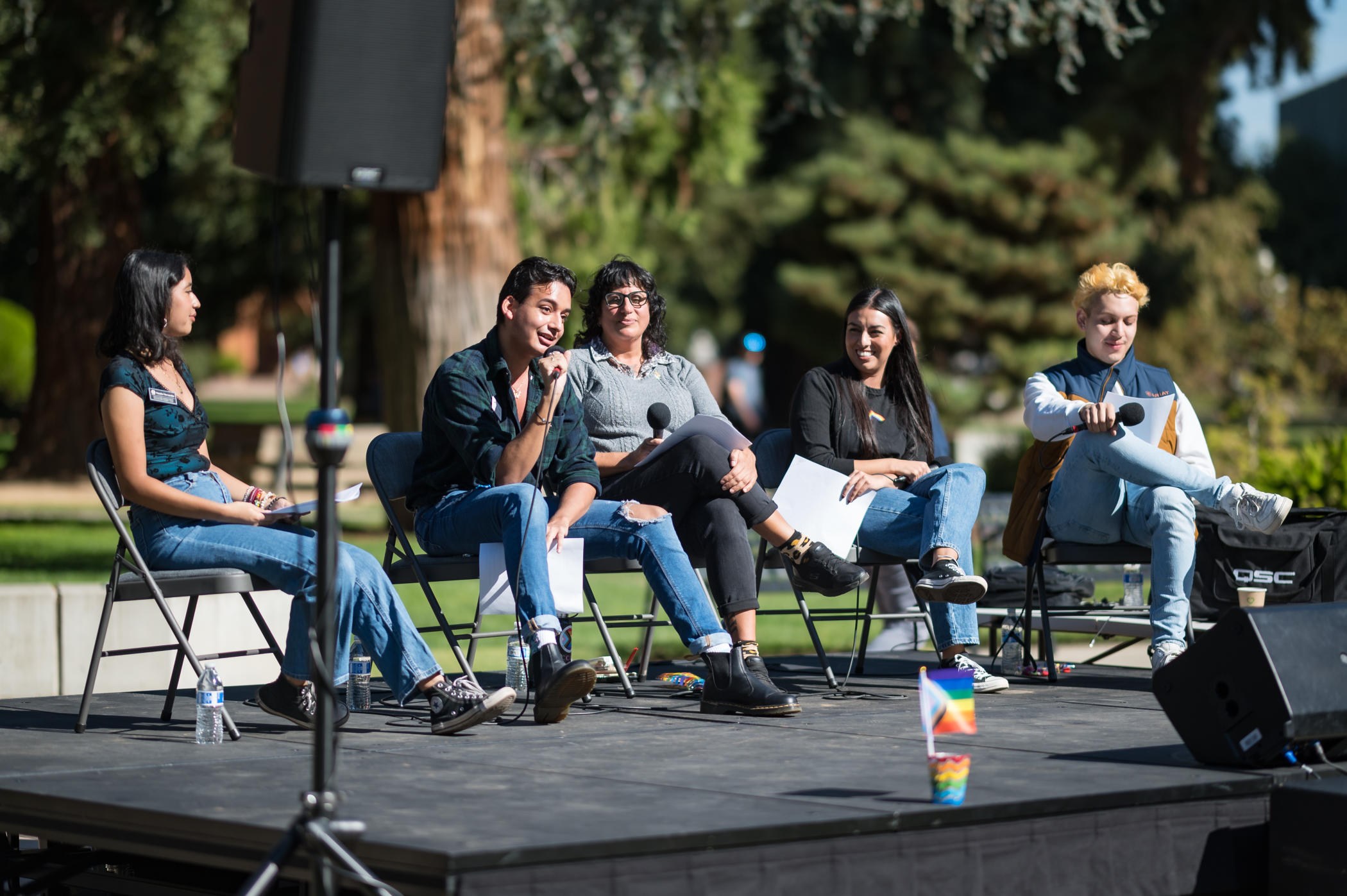Aux Talks Strikes a Chord for Connection

Natalie Hernandez, Abraham Trujillo, Gabby Medina Falzone, Daisy Rolon, and Oscar Cisneros-Magana (left to right) are lead through guided question conversation centered around music that played a role in their experiences in the LGBTQIA+ community to build a bridge and make connections during the Aux Talks: LGBTQIA+ Edition on Thursday, October 27, 2022 in Chico, Calif. (Jason Halley/University Photographer/Chico State)
Experience Aux Talks Thursday from 2–3 p.m. in Trinity Commons. “…feel the energy from the audience and the people that are around because it’s almost euphoric.” – Lilliana Mitchell
Music has long held a powerful place in society. For many, it provides an easier method of connecting to our feelings. It can help us cry, get us dancing, or get us through a daunting workout. Because many of us share that experience, it opens a door to see what else connects us.
Those links are what Lilliana Mitchell, Marvin Herrera, and Malcolm J. McLemore wanted to illuminate when they began brainstorming about ways to connect Chico State’s students with faculty and staff in the fall of 2018. Mitchell (Psychology, ’22) and Herrera were already reaping the benefits of such connection as first-year student employees in the STAR Center, where McLemore (Recreation Administration, ’09) was not only the executive director but also quickly becoming a mentor to both. They settled on a plan Mitchell dubbed Aux Talks.
The concept was simple: a group of students, faculty, and staff gather on a stage to listen to and discuss music that has impacted their lives. The results are fascinating and a whole lot of fun. Now in its third year, the event continues to offer students, staff, and anyone else on campus the opportunity to find connection through a medium with universal resonance. Against the backdrop of a post-COVID world struggling to find stable ground amid multiple crises, the origin story of this event still feels relevant today.
Only months after Aux Talks was born, the campus was evacuated for nearly three weeks in the wake of the devastating Camp Fire. Mitchell was feeling lost, disoriented, and disconnected as were many of her new friends.
“We wanted to connect with our faculty and staff because we were still kids in the sense that we were 18 or 19, and we didn’t know what to do about not just school but in life,” Mitchell remembers. “We didn’t know what to expect because the unexpected had literally just happened to us.”
Mitchell reached out to McLemore, the closest on-campus connection she had. She recalls some small pieces of advice he gave, but what really helped her navigate the moment was McLemore’s admission that he was feeling lost as well. And that it was okay to feel that way. That was the connection Mitchell needed. Ever since, she has made it a point to make similar connections for herself, while helping others to do the same.
Herrera also understands that connection is capital. He graduated in December with his bachelor’s degree in social work. But long before that, he connected with McLemore during his first year at Chico State. That relationship changed his trajectory tremendously. Herrera went on to become the cultural program coordinator at the Cross-Cultural Leadership Center (CCLC) where he was tasked with helping to create invaluable connections for others.
Mitchell, Herrera, and McLemore hope the program they created together sparks similar connections for other students, staff, and faculty. It certainly appears to be.
In November, an Aux Talks panel was put together to celebrate Native American Heritage Month. As the music played and the panelists’ personalities emerged, so did smiles, laughter, and even a little dancing on the stage and among those watching and listening. The scene was full of positive vibes and togetherness. A supportive community pop-up and celebration emerged on the Trinity Commons lawn.
The next edition of Aux Talks, celebrating Black History Month, takes place February 16 from 2–3 p.m. in Trinity Commons and Mitchell made a passionate appeal for you to put it on your calendar.
“You must experience it,” Mitchell said. “You have to see it and listen to the songs being played, the questions being asked, the laughs, the responses. And feel the energy from the audience and the people that are around because it’s almost euphoric. Even if it’s in between classes, and you only can stop for two minutes, stop for two minutes. I’m positive you will like it more than being two minutes early to class. You might even wind up being a few minutes late.”
The students involved are not alone in their appreciation for the connection. Tracy Butts, dean of the College of Humanities and Fine Arts and professor of African American, American, and multicultural literature, appreciated the insight into Mitchell and the other students who attended.
“We got to learn a lot about the students through the sharing of our music, their responses, and the songs they knew,” Butts said. “There was a sense of community that came from this approach and activity that maybe only our students could have come up with. It was cool to see how they’re thinking about culture and how they’re approaching culture and attempting to bridge the gaps between students, faculty, and staff.”
Songwriter Harlan Howard is credited with the phrase “three chords and the truth,” since passed down from one generation of musicians to the next. But these days it only takes one to spark that kind of conversation and connection—the aux cord. It’s the link between the mobile phone and the car stereo or laptop. Being entrusted with the aux cord is a high honor, granted only to those trustworthy enough to not abuse it.
Mitchell, McLemore, and Herrera have shared the aux cord. They know of its power. Thanks to Aux Talks, many others have as well. This Thursday, come experience the power for yourself.


